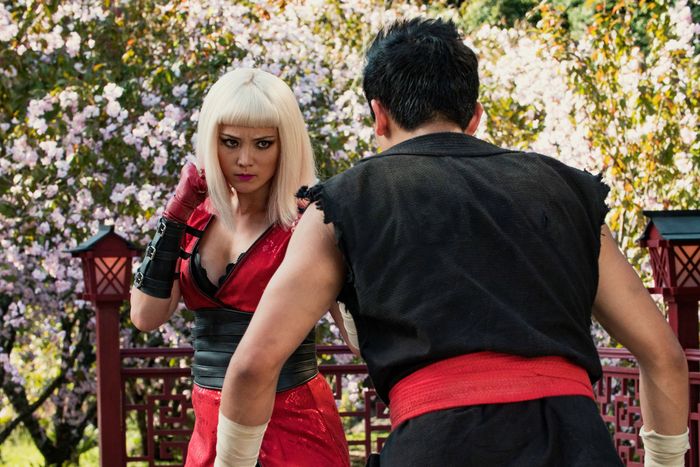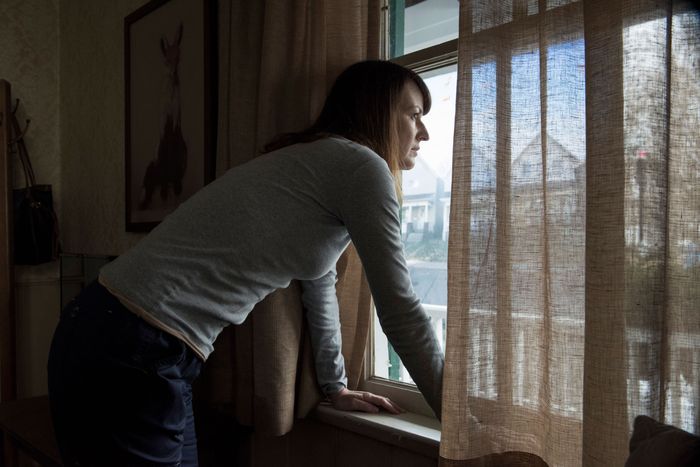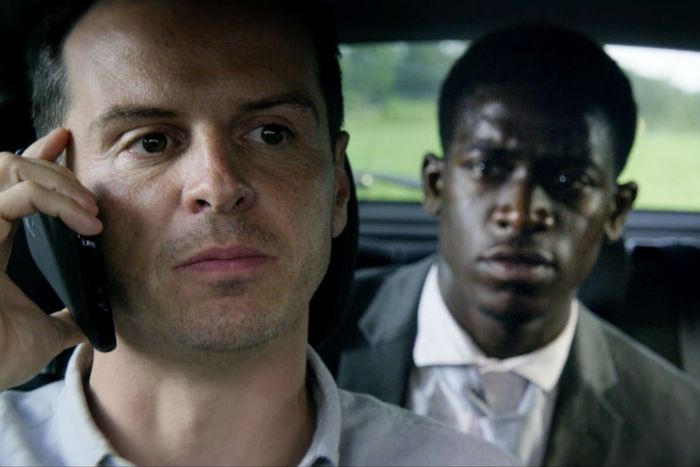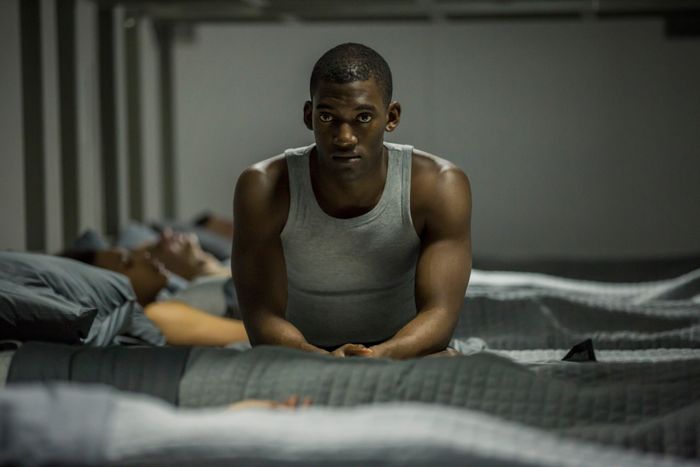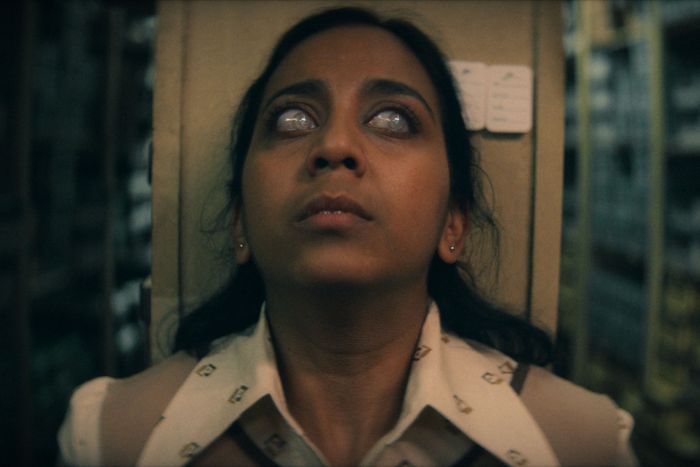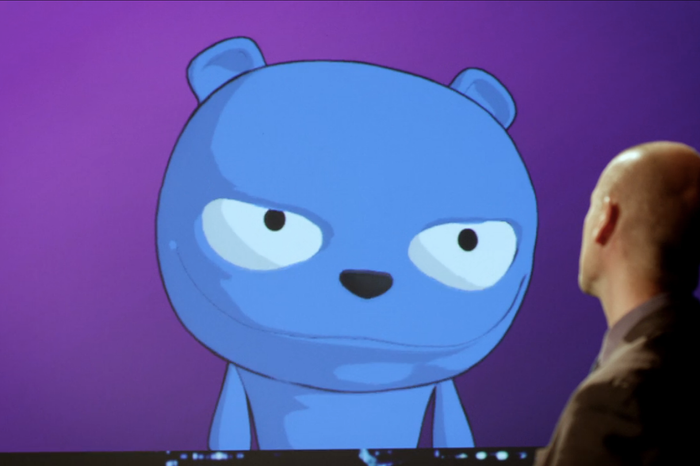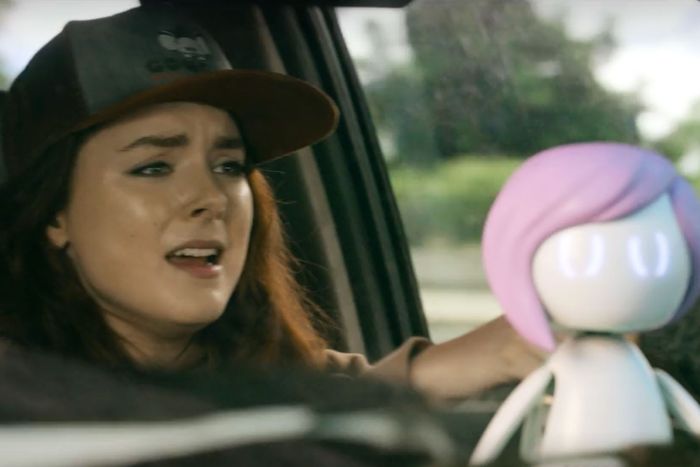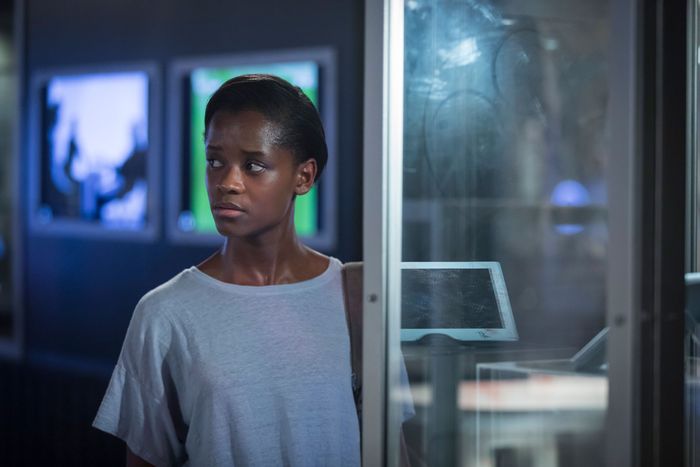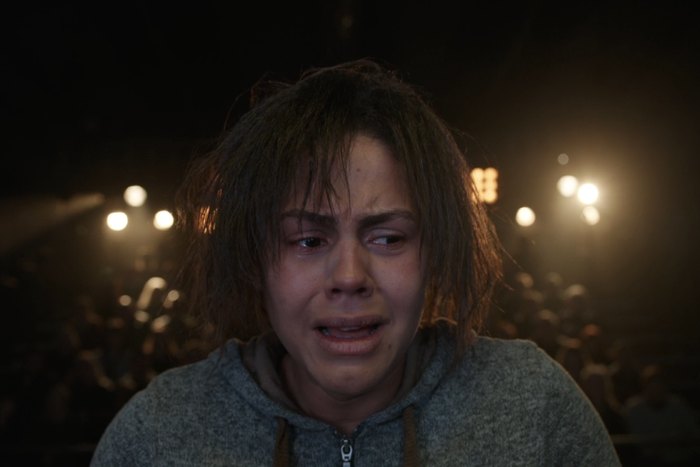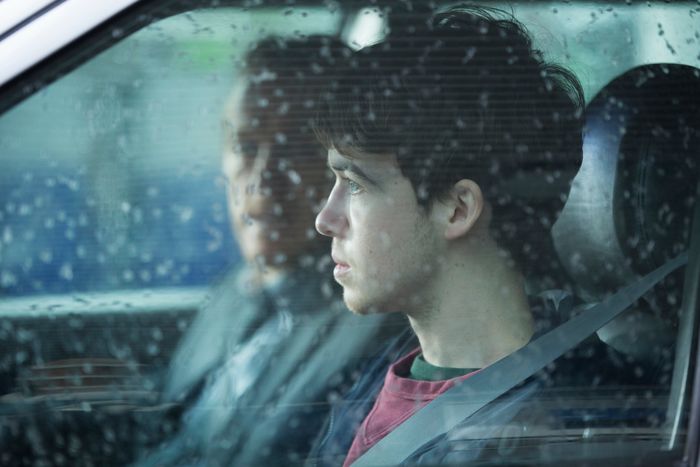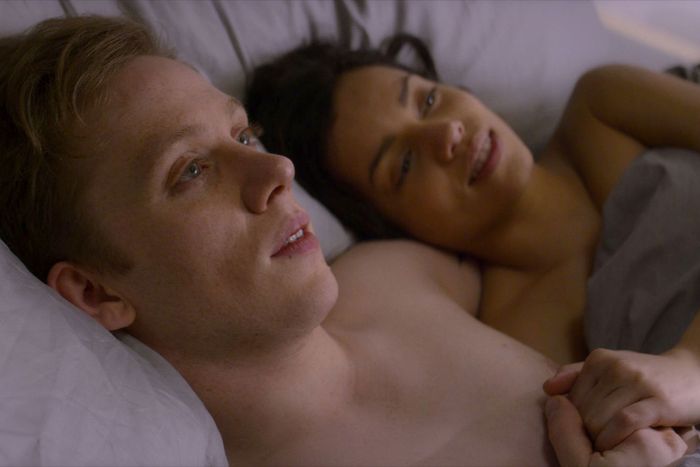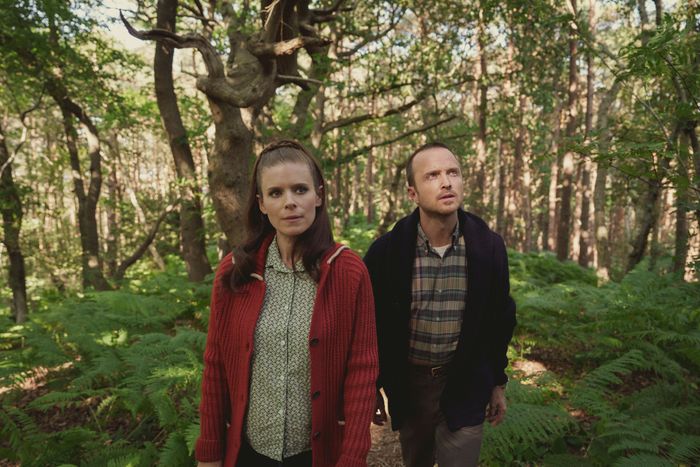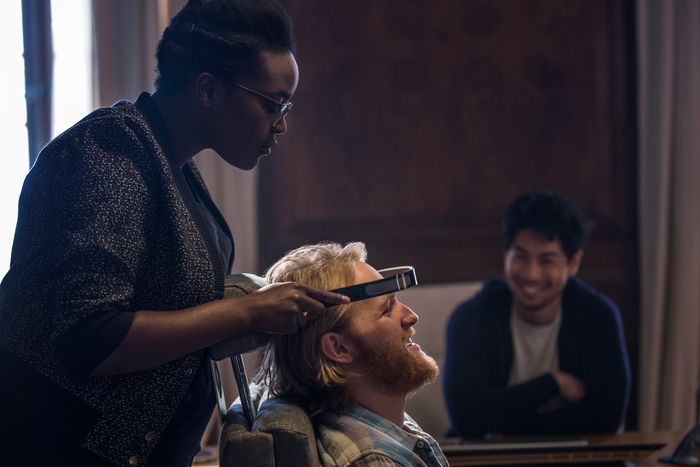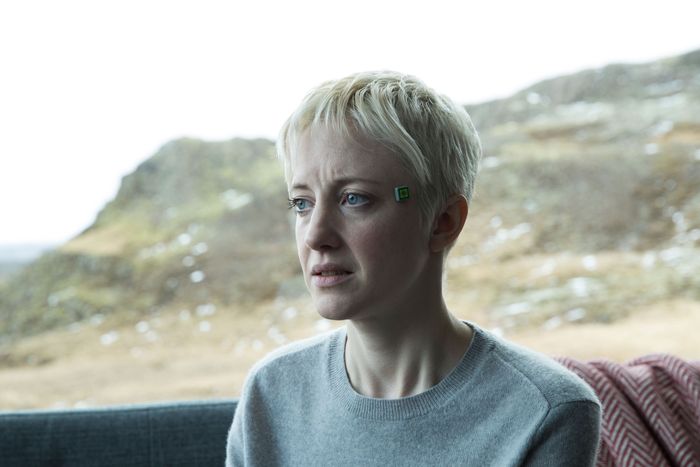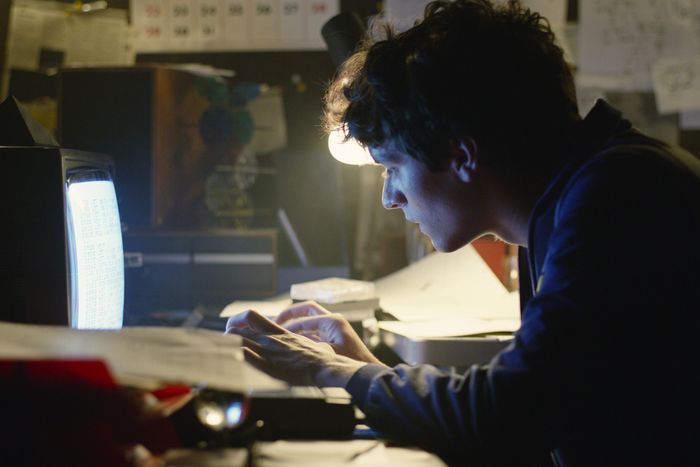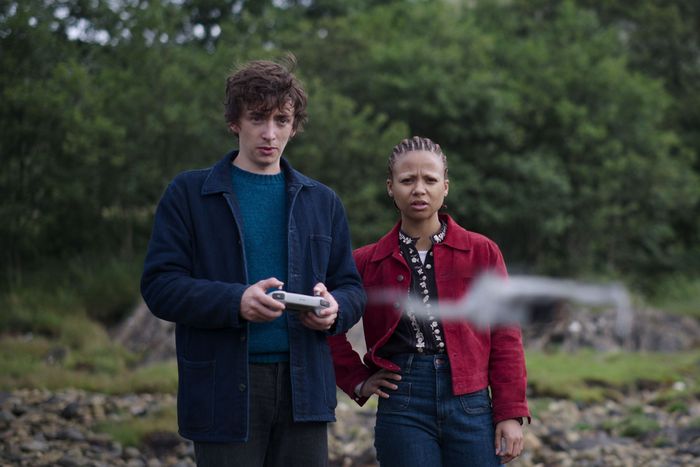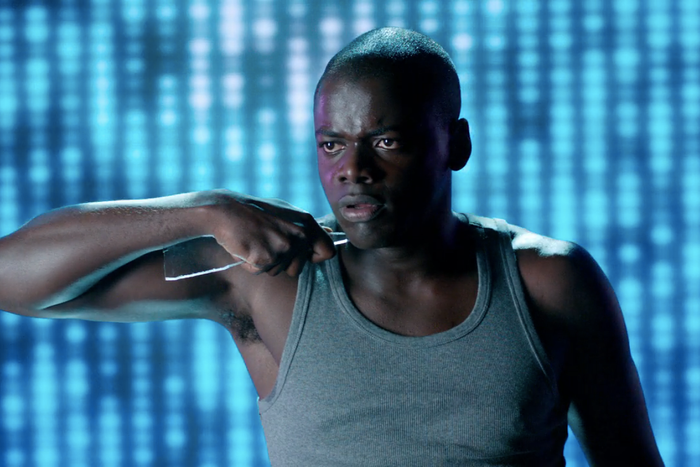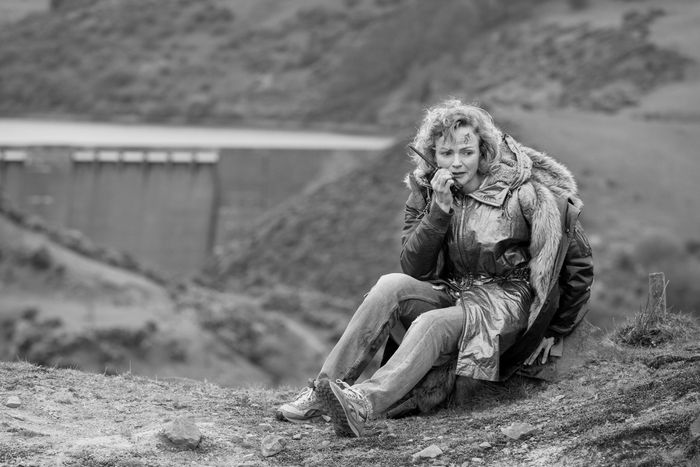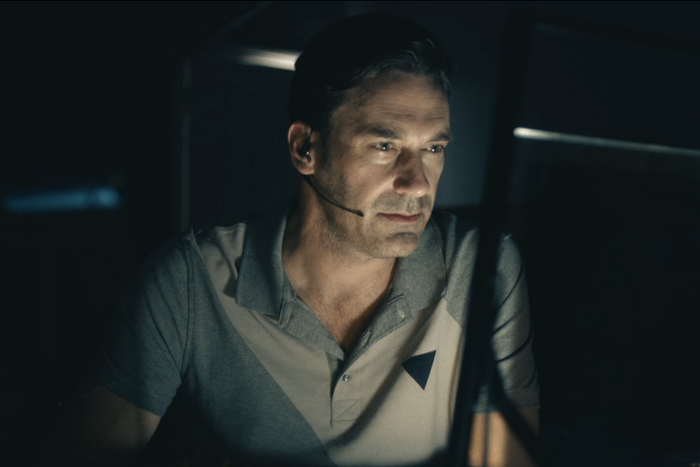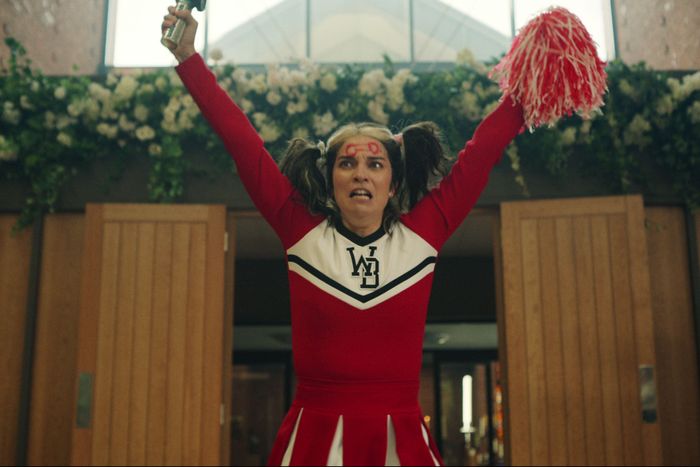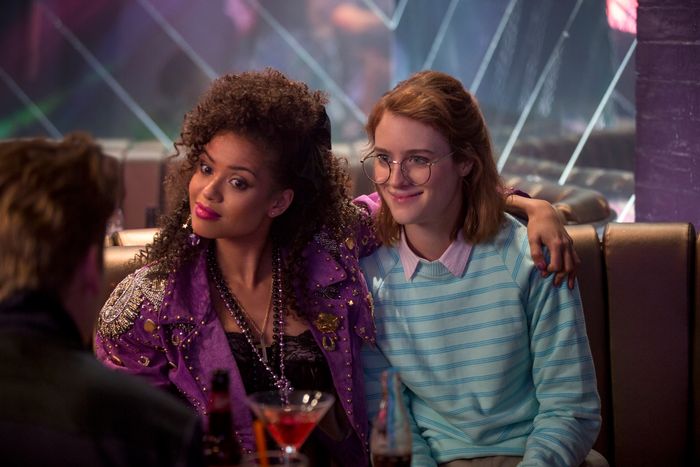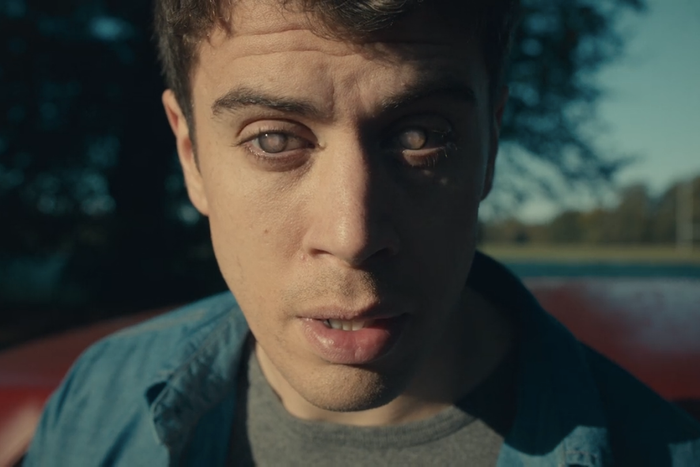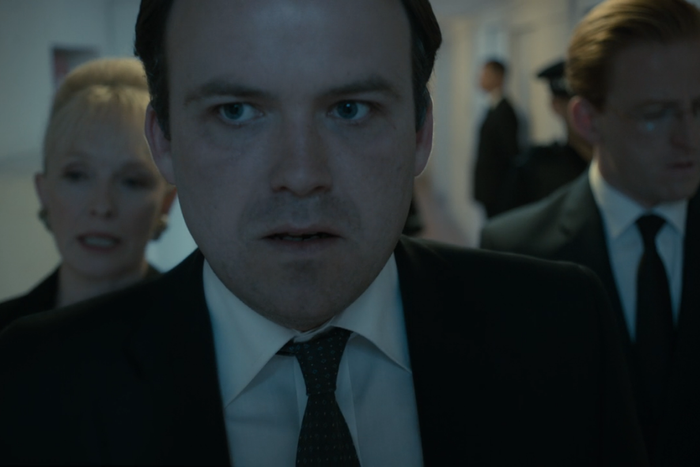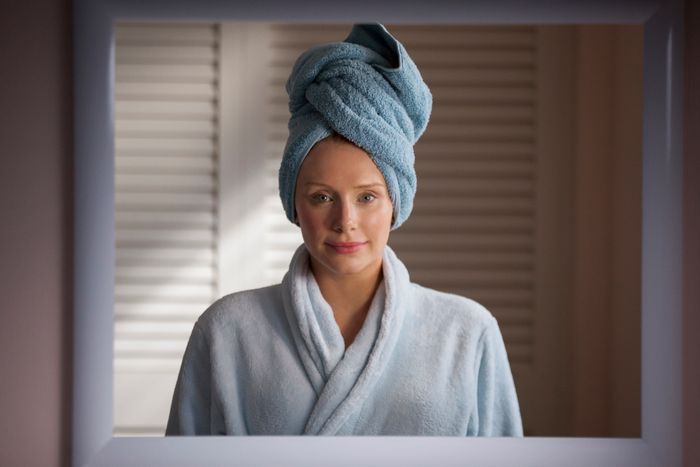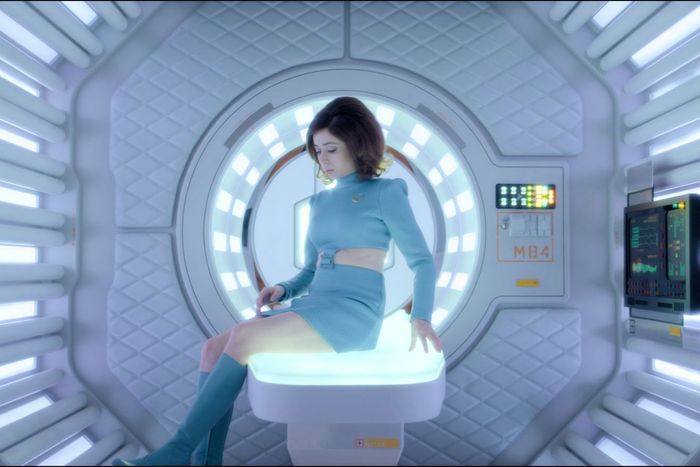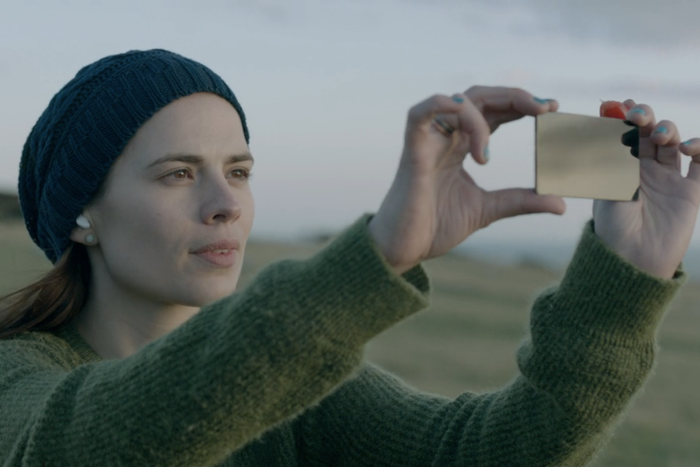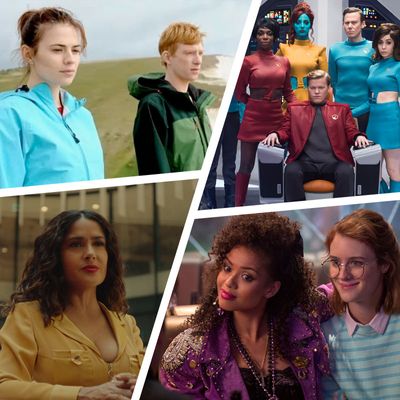
This list was previoiusly published. It has been updated to include episodes from Black Mirror’s sixth season.
Anthologies are all the rage these days, from Ryan Murphy’s ever-expanding empire of miniseries to Joe Swanberg’s collection of romance shorts. Yet no program has taken advantage of the elasticity of anthology storytelling quite like Charlie Brooker’s Black Mirror, trading pet themes, genres, creative personnel, and tones from one episode to the next. A newfangled, potentially disastrous technology pops up in each installment, giving the series a healthy sense of cohesion, but the six seasons aired so far couldn’t be more all over the map. Political satires and future dystopias, cop procedurals and war dramas, soulless nihilism and life-affirming humanism: If you dislike Black Mirror, perhaps you just haven’t found the right episode.
Such a varied palette of styles and stories means that the series is naturally hit or miss. It delivers far more hits than misses, but hashing out which episode hits hardest can be helpful for a newbie who wants to customize their viewing order. Read on for Vulture’s definitive ranking of all 28 episodes of Black Mirror, from worst to best.
28. “Striking Vipers” (Season 5, Episode 1)
As if the human race was ever going to use fully immersive VR for anything but CGI-enhanced sex. In this instance, a pair of bros discover that they’re not as hetero as they thought when they can’t stop banging each other’s brains out while inhabiting their shredded Asian avatars in a souped-up Tekken knockoff. The episode plows through a set of emotional conditions requiring the utmost delicacy and sensitivity, first going for awkward laughs and then just awkwardness, ultimately melting into a pile of unearned sap. After posing novel questions to itself about desire, the script’s sense of self-inquiry never matures past “It’s not gay if he’s a she, right?” Lead actors Yahya Abdul-Mateen II and Anthony Mackie share minimal chemistry, though the episode’s most craven move has to be contriving a loophole giving the romantic opposites an easy out. (They’re supposed to show no visible attraction to one another, you see!)
27. “Arkangel” (Season 4, Episode 2)
The bad moms of Bad Moms have nothing on Rosemarie DeWitt’s Marie, the baddest mom of all. She thinks she’s only got her daughter’s best interests at heart when she signs the girl up for an experimental program that livestreams her vision to mommy’s iPad, but once young Sara hits her teen years, she doesn’t see the flagrant violation of her personal privacy that way. Situated on a shaky foundation — how could anyone in their right mind not see this idea’s potential for disaster? — and indelicately directed by Jodie Foster, this episode muddles its own commentary on the hazards of overzealous parenting and the emotional malformation resulting from it. If an episode insists on being dumb, the least it could do is be entertaining. “Arkangel” is neither.
26. “Mazey Day” (Season 6, Episode 4)
No one’s really pro-paparazzi (except, I would imagine, the paparazzi), a broad consensus that has a way of making screeds against them come off as obvious or redundant — though that’s hardly the gravest issue facing this steadily worsening take on celebrity tabloid culture, bluntly announced in the opening moments with a radio broadcast about the birth of Suri Cruise. Like a grim projection of that celeb baby’s future, teen starlet Mazey Day (Clara Rugaard) approaches a Lohanian breakdown accelerated by the shutterbugs (chief among them one played by Zazie Beetz, who is conflicted about her dirty work) hounding her all the way to the remote rehab facility where it would appear she’s going to dry out. The revelation of her actual condition comes out of nowhere, feels decidedly un–Black Mirror, does nothing to enrich the ideas put forth about predatory media, and stumbles through the steps of the traditional horror mold into which it sorts itself. It’s a head-scratcher, less in the usual “Let us ponder these thought experiments” sense and more in the “Why bother?” sense.
25. “Smithereens” (Season 5, Episode 2)
Fleabag’s fan-favorite Hot Priest is mad as hell and he’s not going to take it anymore. Andrew Scott plays a guy whose picture probably accompanies the dictionary definition of “disgruntled,” a rideshare driver with a plan to kidnap a higher-up at a social media start-up against whom he has a monomaniacal grudge. One snafu begets another, and he winds up in a hostage standoff accelerated by his corporate nemesis’s near-omniscient access to information. Aside from that tweak to the crisis-negotiation formula, it all plays out relatively straightforward; not even a late-in-the-game appearance from Topher Grace as “Schmack Schmorsey” (actual name: Billy Bauer, though the likeness can’t be missed) adds less depth than it could. The risible final montage casts Brooker in a moralist light befitting Mother Hen, leaving us with a storybook fable, the moral of which is to not check our damn phones while behind the wheel.
24. “Men Against Fire” (Season 3, Episode 5)
Turning attention to the ravages of wartime and the way troops are brainwashed to kill, Brooker stumbles on his landing in an uncharacteristically weak third act. A soldier starts to wrestle with new feelings and a peculiar sickness after gunning down three of the feral mutant abominations that stalk a futuristic society. His sudden changes could be PTSD, or they could be something else. The eventual “twist” is so clearly telegraphed ahead of time that it hardly qualifies as such, and then when Brooker unloads it, the script fails to break any ground not already terraformed by the likes of Starship Troopers. Add a dash of violence falling further to the side of gratuitousness than usual, and you’ve got a slog of an hour with no reward for completing the mission.
23. “Demon 79” (Season 6, Episode 5)
Presented as a found film from the late 1970s — a gimmick taking the place of the usual tech-focused hook — this nearly feature-length horror-comedy sends a mild-mannered department-store saleswoman (Anjana Vasan) on a morbid journey. A demon taking the form of Boney M. lead singer Bobby Farrell (played by Paapa Essiedu) informs her that she must claim the lives of three souls in three days’ time or the world will be engulfed by the flames of Armageddon. Luckily for her (and us), she has been harboring jagged fantasies of smashing the faces of the many annoying racists who mill about her workplace. The script has a good time teasing out the logistics of her dark errand, though it leads her only to a big eschatological shrug that undercuts the moral scale-tapping preceding it. It all ends not with a bang but a cop-out whimper.
22. “The Waldo Moment” (Season 2, Episode 3)
The best Black Mirror episodes tiptoe along the tightrope between the plausible and the absurd, but “The Waldo Moment” loses its balance. In today’s political climate, the notion that a bawdy cartoon bear could be elected to public office is but one step down from a permanently enraged pumpkin-man doing the same, but Brooker doesn’t give his premise the fidelity seen in the equally outrageous “The National Anthem.” As such, the political commentary goes too broad, accusing the public of being dum-dums and filing the tired charge that politicians are phony. Brooker is at his most effective when he avoids pointing fingers and lets the story implicate whatever needs damning all on its own. “The Waldo Moment” fails to do either.
21. “Rachel, Jack, and Ashley Too” (Season 5, Episode 3)
Miley Cyrus drops in to portray Ashley O, the sort of pop star she specifically elected not to be: her every movement focus-grouped by a managerial team, spine-cracking proportions of stress on her slight shoulders, reservoirs of pain dammed by a sunny go-getter demeanor. Her feeling of self begins to break down as a robot mini-me dubbed Ashley Too goes to market and one ends up in the home of superfan Rachel (Angourie Rice), herself a little doppelgänger for the music phenom. The notion of fractured consciousness goes one level deeper after Ashley falls into a coma and her label tries to resurrect her via hologram, and yet Brooker would rather use his money and our time to make the age-old (and, at this point, largely false) proclamation that Top-40 music is artistically hollow pap. A lack of wit to prop up a squandered premise leaves Cyrus out of tune.
20. “Black Museum” (Season 4, Episode 6)
A young woman (Letitia Wright) pops into an abandoned roadside attraction that collects memorabilia from techno-crimes, and hangs around for three disturbing yarns from the intense, unsettling proprietor (Douglas Hodge). Each one involves the vicarious sharing of experience or sensation: A doctor taps into his patients’ pain before he starts using them for twisted pleasure; a man agrees to share his mind with his vegetative wife’s consciousness, who turns out to be one annoying mental roomie; and one unusual exhibit invites visitors to electrocute the hologram of a wrongfully convicted black man for sick kicks. There’s a self-reflexive statement on the voyeuristic sadism to Black Mirror’s darker hours in here somewhere, but it only begins to rear its head in the final third after the first two fail to cohere into anything of substance. The second story in particular ranks among the most conceptually flimsy in the series.
19. “White Bear” (Season 2, Episode 2)
This is Brooker’s shakiest “uh, what’s going on?” episode, a subcategory of Black Mirror installments defined by the presentation of a strange new circumstance with hidden significance, which isn’t revealed until a key moment. (Also fitting this profile: the equally lame “Shut Up and Dance,” and third-season highlight “San Junipero.”) A woman flees unknown attackers, recorded via smartphone by everyone in her immediate vicinity. There may be some larger point about voyeurism or exploitation or how annoyingly fast phone batteries drain, but it’s lost beneath a simplistic twist that pulls a switcheroo and fails to do much else. “The good guy was the bad guy all along!” is almost always a feeble turn, and if Brooker pulling that move once was bad enough …
18. “Shut Up and Dance” (Season 3, Episode 3)
… He then goes back for seconds in this spiritual sequel. All but identical to “White Bear,” this hour swaps in seemingly innocent teen Kenny, who’s surreptitiously videotaped in a compromising position and then blackmailed via anonymous text messages. The identity of his tormentors and their reason for targeting him remains a mystery until the final minutes, which turn the episode into one sick, distasteful joke. There’s some decent character work in the middle between Kenny and a fellow hostage he meets while carrying out his captors’ instructions, but the rest is sheer unpleasantness in want of a greater statement.
17. “Hang the DJ” (Season 4, Episode 4)
Dating is awful enough as is, so maybe you can’t blame swinging Frank (Joe Cole) and Amy (Georgina Campbell) for signing up to The System, a service that automates everything from dinner to going home together to the duration of a relationship. But while they cycle through a series of partners — some not so bad, some comically mismatched — they realize all they’ve ever wanted was one another, if only the algorithm would pair them up again. A dud of a late twist undoes a lot of this tender love story, but Brooker gets the laughs he’s going for, and lands a couple solid blows against the scourge of app-based courtship. To quote a friend paraphrasing Daniel Ortberg: What if Tinder, but too much?
16. “Beyond the Sea” (Season 6, Episode 3)
Brooklyn director John Crowley gets behind the camera here for an alternate-history setup focusing on the emotional over the conceptual, though his pedigree would suggest a higher level of nuance than this love triangle with dull points. In the early days of space exploration, Cliff (Aaron Paul) and David (Josh Hartnett) maintain the low-orbit station in which they live full time; they can give themselves breaks from the loneliness by temporarily transferring their consciousnesses into robotic doubles back home on Earth. So when David’s surrogate body gets “murdered” along with his family, he has no way back — until Cliff graciously allows him to take a spin in his android, much to the interest of Cliff’s undersexed wife (Kate Mara). An agreeably soapy attraction percolates between them, albeit at a slow burn far too gradual for an overextended 80-minute run time that somehow still cuts itself off one beat too early. It doesn’t help that Paul’s performance fails to sufficiently differentiate between the parts of his eventual split role. It’s just another factor detracting from the middle section’s kinky intrigue — the most entertaining element in an affair that’s best when embracing its torrid side.
15. “Playtest” (Season 3, Episode 2)
You’d need to have a death wish to volunteer for a full-immersion, augmented-reality video game that uses your own memories to drop your worst fears right into the world around you. But Wyatt Russell’s weary globetrotter does exactly that, maybe because he does really want out. His estranged relationship with his mother pains him, and his constant traveling suggests a restlessness at his core. Either way, he walks right into a layered vortex of increasingly personal terrors, leaving viewers to spook themselves by imagining the horror they would create for themselves. It’s too straightforward to rank among the series’ best, but damn if it isn’t the scariest.
14. “Crocodile” (Season 4, Episode 3)
In the bleak expanses of Iceland, things go from bad to worse to much, much worse for a woman named Mia. You ever have one of those days where your ex-boyfriend shows up out of nowhere and threatens to upend your life by going public with the shameful secret that you both accidentally killed a man years before, so then you have to off him to shut him up, but then a complex series of events leads a mild-mannered insurance claims adjuster to read your mind and suddenly the only thing you can think about is the murder you just did, so now something needs to be done about her too, and plus you’ve got to make it to your kid’s play that night? No? Just Andrea Riseborough, outstanding as a unraveling woman willing to do anything to hold onto the domestic Eden she’s created for herself? This Scandi-noir follows her down the garden path to hell, paved as it is by frantic ass-covering.
13. Black Mirror: Bandersnatch
Brooker’s most ambitious effort harnessed the interactivity of the streaming format for a choose-your-own-adventure story that leans on the fourth wall until the characters can start to see through the cracks. We “play” as Stefan (Fionn Whitehead, trembling like he’s still got Dunkirk shell shock), who realizes in the course of designing his own choose-your-own-adventure game that he’s being controlled in a similar scenario. The viewer doesn’t hold all that much sway over Stefan’s outcomes, but the illusory nature of free will is part of the point Bandersnatch is trying to make. The real problem is that for all the time spent on the technological back end and the philosophical foundations, Brooker’s lost sight of his foreground. The structural container may be clever enough, but Stefan’s story isn’t.
12. “Loch Henry” (Season 6, Episode 2)
Setting aside the lack of any connection to the series’ unifying technology theme — unless we’re willing to consider a camcorder as qualifying, which, no — this Scotland-set murder mystery has plenty to say on the timely matter of the true-crime boom, little of it positive. A couple (Samuel Blenkin and Myha’la Herrold) pass through his hometown on their way to shoot a documentary about eggs, only for her to get sidetracked once she catches wind of the grisly slayings that shattered this idyllic, mossy community years ago. Documentary ethics quickly fall by the wayside as she’s taken in by the sort of juicy, lurid narrative they swore they would never touch, a pilgrim’s regress indicting this nonfiction fad as exploitative and shameless. As the episode turns into a cheeky riff on the very thing it’s meant to critique, however, it indulges in long-telegraphed plot twists and scandalizing deviance in line with a dumber sort of fun. A nicely ambivalent final shot confers a perhaps unearned dramatic weight on a nasty little whodunit that gets sillier as it snowballs from thoughtful auto-commentary into all-out jolly sadism.
11. “Fifteen Million Merits” (Season 1, Episode 2)
Andy Warhol famously prophesied that in the future, we will all be world famous for 15 minutes. What he could not have imagined were the depths of debasement we’d be willing to sink to get there. Brooker puts the carnivorous culture of reality TV on trial in this diabolical hour, set in a world where lower-caste citizens pedal stationary bikes to power their surroundings and earn meager currency. One member of the underclass (Jessica Brown Findlay) strives for more by singing for her life on a live TV special, another (Daniel Kaluuya) bursts onto a broadcast to deliver a screed against his overlords; both of their lives get significantly worse as a result of these choices. Brooker’s commandment is to worship no idols, most especially of the American variety.
10. “Hated in the Nation” (Season 3, Episode 6)
For the final episode of the third season, this sci-fi TV show delivers a buddy-cop movie. But plenty more than a 90-minute run time and a genre switch up set “Hated in the Nation” apart from the pack: There’s Kelly Macdonald as the foul-mouthed vet with all the best one-liners, a troubling metaphor for outrage-fueled internet pile-ons, a serial killer, and of course, homicidal robotic bees. Brooker cycles through the stock beats of the police narrative and freshens them all up using his wonderfully weird premise. Bonus points for paying homage to the most memorable sequence in The Birds, almost matching Hitchcock’s original for sheer scare factor.
9. “Metalhead” (Season 4, Episode 5)
Run or die. That’s the dramatic foundation of this pared-down nightmare about the primal imperative to survive when pursued by a predator. And hunters don’t get much more lethally effective than the “dog,” an unassuming drone that will stop at nothing to blow any remaining human craniums to smithereens. A post-apocalyptic survivor played by Maxine Peake accidentally lands in a dog’s crosshairs and spends this harrowing hour fleeing for her life in a clash between human and machine. Even if this wasn’t the most formally adventurous episode in a walk, boldly toying with contrasts between fast and slow motion to accentuate the already striking monochrome photography, it’d still boast the distinction of being utterly terrifying. You’ll never look at a Roomba (or, you know, the real drones we’ve designed to kill people) the same way again.
8. “White Christmas” (2014 Special)
A pair of men hunker down during a blizzard at a remote outpost to share three tales of deception and murder, but they’ve both got secrets galore. In what must be the darkest Christmas special ever made, Jon Hamm relates his past life of sleazy seduction-coaching by night and torturing digital copies of living people by day, racking up a host of futuristic sins along the way. His companion Rafe Spall isn’t much better, having handled his separation from his wife, shall we say, poorly. As mini-twists give way to jaw-dropping mega-twists and the episode’s core concept gets frightfully postmodern, both actors deliver skin-crawling work as villainous but sympathetic figures.
7. “Joan Is Awful” (Season 6, Episode 1)
With his inevitable take on the chilling recent advances in AI and deepfake technology, Brooker sets up a disturbingly plausible vision of an artistic apocalypse, in which Netflix (fictionalized as “Streamberry” yet unmistakably itself right down to the tu-dum noise) auto-generates customized content based on the life rights users unwittingly give away in their subscription agreements. Brooker’s hand-biting swipes at his streaming benefactors pack a more potent wallop than the story itself, an odd grafting of his favored “gizmo drives a person mad” schematic onto a heist thriller that pares down the premise of the wilder, weirder Mrs. Davis. A good number of laughs, many of them from a commanding Salma Hayek as herself, carry an episode that ultimately gets lost in a meta-structural hall of mirrors reducing real concerns into a multiverse misadventure. However comic, the stoked anxieties over the extermination of creative integrity prove far scarier than any of the more overt frights on offer in the sixth season.
6. “San Junipero” (Season 3, Episode 4)
An anomaly for Black Mirror, this elliptical romance is the rare installment that warms the heart instead of injecting it with poison while bludgeoning it to death. Party gal Kelly (Gugu Mbatha-Raw) and shy new girl Yorkie (Mackenzie Davis) go from gal pals to lovers in a hot and humid SoCal beach community, but greater forces conspire to pull them apart. Remaining together will require a sacrifice that may be too much for them to bear, but isn’t love worth the cost? The resolution, too ingenious to detail here, concludes with the finest and most unexpectedly poignant visual pun in a series full of them.
5. “The Entire History of You” (Season 1, Episode 3)
Have you ever gotten a text message from your crush and spent the next three hours obsessively examining it down to the finest detail, parsing out each word choice and dropped comma? “The Entire History of You” takes that tech-enabled scrutinizing of minute details and extends it to nightmarish extremes, driving one man to madness over a possibly imagined slight. Brooker turned over the writers’ reins to Jesse Armstrong (who would go on to create Succession) and received an unsparing melodrama of jealousy, insecurity, and hot tempers. Keep an eye out, too: Robert Downey Jr. was so taken with the episode’s concept that he bought the movie rights in 2013.
4. “The National Anthem” (Season 1, Episode 1)
It’s, uh … well … it’s the one where the prime minister has sex with a pig. Black Mirror burst out of the gate with one of those “just bad enough to be genius” ideas that most writers spend entire careers chasing. A popular moppet in the Royal Family has been kidnapped, and the parties responsible have no desire for money or power. All they want is to see Prime Minister Michael Callow (Rory Kinnear) get it poppin’ with a pork chop on live television. Brooker turns what would otherwise be a dark comedy sketch into an astute depiction of public opinion’s changing tides, and the uncanny speed with which the unthinkable enters the realm of the acceptable. He plays out his premise with utter commitment, fully exploring what it would actually be like if a world leader did indeed sample the other other white meat.
3. “Nosedive” (Season 3, Episode 1)
A roster of top-tier talent joins Brooker for this immaculate satire on the culture of likes and faves: leading lady Bryce Dallas Howard as a upwardly mobile type aggravated over a ubiquitous rating system that’s sabotaged her social life; director Joe Wright renders an antiseptic future dystopia in warm pastels and orderly shot compositions; and Mike Schur and Rashida Jones share credit on the hilarious, moving, supremely unsettling script. Seldom is the guiding theme of Black Mirror — the insidious ways in which technology alters human behavior — expressed with more lucid clarity. If any episode will make you chuck your iPhone into the nearest body of water, it’ll be this one.
2. “USS Callister” (Season 4, Episode 1)
Forever destined to be known as “the Star Trek one,” Brooker’s brilliant meta-critique of shoddy fiction drops the act after the first scene. (Though it does reverently reproduce the warm, worn look of a vintage TV program before smash-cutting into the cold light of the real world.) Brooker prefers deconstruction to straight homage, and here he uses the Trekkie stuff to pick apart the darker side of fanfic along with the distinctly male entitlement that often informs it. Jesse Plemons is dynamite as a loser who playacts a winner in a virtual-reality simulation called Space Fleet, where he uses his coding omnipotence to take revenge on everyone in the office who’s ever wronged him. And as the challenger mounting a last-ditch attempt to overthrow his control, Cristin Milioti delivers a superb performance. A writer ought to treat their characters like they’re real people, and this episode puts that concept into practice along literal terms in turns hilarious and chilling.
1. “Be Right Back” (Season 2, Episode 1)
The top spot has to be Domhnall Gleeson and Haley Atwell’s high-concept tearjerker. What other hour so deftly balances the cerebral sci-fi thought experiments that viewers love with the sentimental core that they don’t always expect? Brooker tackles nothing less than death itself for his greatest feat, setting up a future where a widow can have her late husband’s personality, aggregated from social-media accounts, uploaded into a new body. But just as the people we date to replace lovers we’ve lost inevitably disappoint, so too does the clone develop bugs that underscore the futility of trying to hold on to what’s already gone. Packing a lethal emotional gut punch, “Be Right Back” offers deep wisdom about the hazy intersection between human innovation and the elemental forces of life itself.


